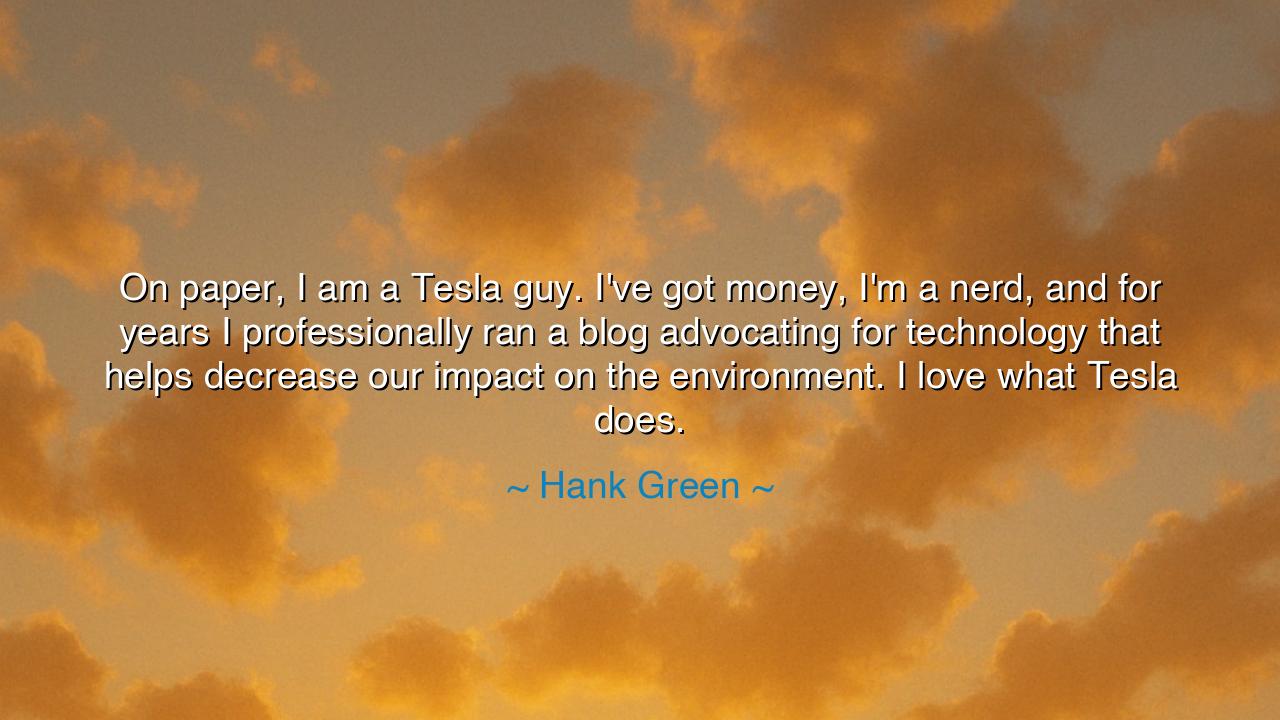
On paper, I am a Tesla guy. I've got money, I'm a nerd, and for
On paper, I am a Tesla guy. I've got money, I'm a nerd, and for years I professionally ran a blog advocating for technology that helps decrease our impact on the environment. I love what Tesla does.






In the words of Hank Green, teacher, writer, and advocate for science, we hear both admiration and reflection: “On paper, I am a Tesla guy. I’ve got money, I’m a nerd, and for years I professionally ran a blog advocating for technology that helps decrease our impact on the environment. I love what Tesla does.” His confession is not merely about cars, nor even about a company, but about the meeting place of identity, values, and innovation. It speaks to the yearning of the modern soul to live in harmony with the earth while embracing the marvels of progress.
For to say he is a Tesla guy “on paper” is to acknowledge how our outward identity is often measured. Wealth, intellect, and passion for innovation make him appear the ideal customer of a company that stands as a symbol of futuristic living. Yet hidden beneath this statement is a deeper wisdom: that one’s true allegiance is not determined by possessions or appearances, but by values and conscience. To be a “Tesla guy” is not merely to drive the car, but to align oneself with a vision of a future that respects both progress and planet.
The heart of his words lies in his devotion to technology as a force for good. Hank Green, who has long labored to explain science and celebrate innovation, reveals that what excites him is not machinery alone, but its power to reduce harm, to heal the wounds inflicted by human excess upon the earth. This is an echo of an ancient truth: that invention without purpose is vanity, but invention in service of the common good is noble. The plough that feeds the hungry, the aqueduct that brings water, the telescope that reveals the heavens—these are technologies that uplift. To him, Tesla belongs in this lineage.
Consider the story of Nikola Tesla himself, whose name the company bears. Tesla dreamed not of profit alone, but of free and boundless energy that could uplift humanity. Though mocked, thwarted, and forgotten for years, his vision lived on in the imaginations of future generations. So too does Hank Green, in praising Tesla the company, praise the continuation of Tesla the man’s dream: the use of science and invention to better the human condition and lighten our footprint upon the world.
Yet there is also honesty in his tone. By saying “on paper,” Green hints at the gap that often exists between ideals and reality. The world of commerce is complex, and no company, however visionary, is free from flaws. But what he admires is the aspiration, the striving toward a better world. He loves what Tesla “does”—that is, its mission, its innovation, its symbolic role in shifting humanity toward a cleaner future. This distinction is vital: admiration for an idea must be tempered with the awareness that human institutions are imperfect.
The meaning of the quote is thus twofold: it is about identity, and it is about mission. On one hand, it reflects how society categorizes individuals based on wealth, intellect, and taste. On the other, it affirms that what truly matters is not the label, but the alignment of personal values with the mission of innovation in service of the environment. His love for Tesla is not about status, but about shared vision.
The lesson for us is clear: let your admiration for technology be guided not by fashion, nor by appearances, but by purpose. Support the innovations that serve humanity and the earth, and be mindful of the gap between ideals and reality. Strive to be not just “on paper” aligned with progress, but truly in action—through choices, advocacy, and responsibility.
So let Hank Green’s words be remembered as a teaching: love not the machine for its luxury, but for its power to heal and uplift. Measure your identity not by the possessions you hold, but by the values you serve. And above all, remember that to be a true “Tesla person” is not to drive a car, but to believe in and work toward a future where human brilliance and the well-being of the earth walk hand in hand.






AAdministratorAdministrator
Welcome, honored guests. Please leave a comment, we will respond soon